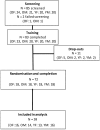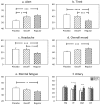The Acute Effects of Caffeinated Black Coffee on Cognition and Mood in Healthy Young and Older Adults
- PMID: 30274327
- PMCID: PMC6213082
- DOI: 10.3390/nu10101386
The Acute Effects of Caffeinated Black Coffee on Cognition and Mood in Healthy Young and Older Adults
Abstract
Cognitive and mood benefits of coffee are often attributed to caffeine. However, emerging evidence indicates behavioural effects of non-caffeine components within coffee, suggesting the potential for direct or synergistic effects of these compounds when consumed with caffeine in regular brewed coffee. The current randomised, placebo-controlled, double-blind, counterbalanced-crossover study compared the effects of regular coffee, decaffeinated coffee, and placebo on measures of cognition and mood. Age and sex effects were explored by comparing responses of older (61⁻80 years, N = 30) and young (20⁻34 years, N = 29) males and females. Computerised measures of episodic memory, working memory, attention, and subjective state were completed at baseline and 30 min post-drink. Regular coffee produced the expected effects of decreased reaction time and increased alertness when compared to placebo. When compared to decaffeinated coffee, increased digit vigilance accuracy and decreased tiredness and headache ratings were observed. Decaffeinated coffee also increased alertness when compared to placebo. Higher jittery ratings following regular coffee in young females and older males represented the only interaction of sex and age with treatment. These findings suggest behavioural activity of coffee beyond its caffeine content, raising issues with the use of decaffeinated coffee as a placebo and highlighting the need for further research into its psychoactive effects.
Keywords: age; caffeine; chlorogenic acids; coffee; cognition; cognitive; mood; phenolic; sex.
Conflict of interest statement
The authors declare no conflicts of interest.
Figures






References
Publication types
MeSH terms
Substances
Grants and funding
LinkOut - more resources
Full Text Sources
Other Literature Sources
Medical
Molecular Biology Databases

